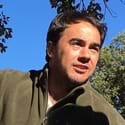Finca El Campete is a family farm in the west of Spain, run by Alfonso Cobaleda.
“Our goal is to get the most from our land in a sustainable way, without exploiting it, as it is the only route to keep the farm business progressing in the many years to come.”
Key areas of sustainable practice
Grass silage is made on the farm and fed to the cows during the winter. Silage production is rare in the region but of great importance as it reduces the effects of over-grazing on the pastures. The silage is mixed with a small quantity of hay and spread as feed in the fields by a tractor and feeder wagon. This has dramatically reduced the time staff spend feeding the cows over winter.
Two hundred hectares, divided evenly between cereals and grassland, are used to grow feed for the cattle. This, along with an extensive grazing system that makes use of land unsuitable for crop production, means the farm purchases less feed, protecting it from volatile, rising feed prices and making it more self-sufficient.
The farm also utilizes electronic ear tags to track herd and monitor off-farm movements, with traceability a key requirement of food and safety regulations.
A strict health and vaccination program is practiced, which is key to maintaining and improving the overall health of the herd. It begins with the vaccination and parasite treatment of the whole herd in February, when the risk is high. Replacement heifers are vaccinated for Infectious Bovine Rhinotracheitis (IBR) and Bovine Viral Diarrhea (BVD).
The suckler cows are cross-bred between a robust local breed called “Morucha” (dam line), and a Limousin or Charolais bull. This produces hardy cows that are calm and easy to handle, calve easily and show good mothering ability. This cross is also better able to cope with the hot summer climate.
The farm operates a system of minimal animal handling, which both prevents unnecessary stress to the animals and minimizes labor costs.
Through careful management, the farm helps to maintain a unique landscape.
The farm is home to several hundred trees, largely cork and holm oaks, and a regime of planting saplings has been implemented to help with their natural regeneration. The farm’s older mature trees are also pruned and cut back to ensure they remain healthy and productive.
Cows and calves are allowed to graze through the trees year-round.
The farm also contains and manages several “high conservation areas,” which provide important habitats for several species of birds and mammals. There is also a small island in a nearby lake that provides sanctuary for over 6,000 cranes that visit the area every year.
The farm is situated in a conservation area and Alfonso operates a Dehesa system. This involves grazing his herd of 900 Morucha cross continental cows year-round on continuous pasture, alongside agroforestry activities to produce and sell cork and wood. This helps to maintain and improve the natural habitat and produce quality beef in a low input system.
Learn more about Alfonso Cobaleda’s story
Explore the case study, where you’ll find extra details on how the farm has performed against the program’s good practice standards and criteria, what external research reveals about the producer’s actions and how improved sustainability benefits them.
“This region of Spain has an incredible and unique environment in which to produce beef. The Dehesa system provides a variety of benefits and challenges to farming in this region, and Alfonso is enthusiastic in his approach to maintaining and protecting this valuable habitat. Herd management is focused on areas such as health, genetics and feeding, which can make a real difference to the economics of the enterprise. Alfonso is also keen to introduce new innovations to improve the efficiency and sustainability of the beef enterprise and has even developed his own beef brand.”




